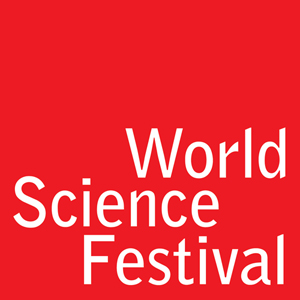World Science Festival
Annual science festival produced by the World Science Foundation From Wikipedia, the free encyclopedia
The World Science Festival is an annual science festival hosted by the World Science Foundation, a 501(c)(3) nonprofit organization based in New York City.[1] There is also an Asia-Pacific event held in Brisbane, Australia.
This article contains promotional content. (July 2022) |
| World Science Festival | |
|---|---|
 The festival's logo | |
| Status | Active |
| Genre | Science festival |
| Frequency | Annually |
| Venue | Various |
| Location(s) | New York City, New York |
| Country | United States |
| Inaugurated | 2008 |
| Patron(s) | Founding benefactors: Simons Foundation, Alfred P. Sloan Foundation, and the John Templeton Foundation |
| Sponsor | World Science Foundation |
| Website | worldsciencefestival |
The foundation's goal is to create a broad public that is "informed about science, inspired by its wonder, convinced of its value, and willing to consider its impact on the future."
History
The festival was founded and established by Brian Greene, professor of mathematics and physics at Columbia University and author of several science books (including The Elegant Universe, and The Hidden Reality); and Tracy Day, a four-time National News Emmy Award-winning journalist, who has produced live and documentary programs for the nation's most prominent television news departments. Greene is now chairman of the World Science Foundation and Day is executive of the World Science Festival.[2]
The festival's events are rooted in science, but also meet the production standards of professional television and live theater events. Founding benefactors include the Simons Foundation, the Alfred P. Sloan Foundation, and the John Templeton Foundation.[3]
Board of directors
- Alan Alda
- Judith Cox
- Tracy Day
- Brian Greene
- Gillian Small
- Tamsen Ann Ziff
The founding benefactors were the Simons Foundation, the Alfred P. Sloan Foundation, and the John Templeton Foundation.[4]
Inaugural festival
The inaugural festival took place May 28 - June 1, 2008, at 22 venues in New York City. The festival, described by The New York Times as a "new cultural institution," included 46 events, a street festival, and, on the first day, the day-long World Science Summit at Columbia University. Among the more than 150 participants, speakers and artists were 11 Nobel Prize laureates. Venues included the American Museum of Natural History, Abyssinian Baptist Church, and New York University's Skirball Center for the Performing Arts at Gould Plaza. The total audience was more than 120,000.[5]
World Science Festival venues

New York City
Over the past 10 years, the festival has attracted more than two million visitors, with millions more viewing the programs online. Programming includes discussions, debates, plays, interactive explorations, musical performances, intimate salons and large outdoor events in parks, museums, galleries and performing arts venues throughout New York City. For a complete list of program, visit the festival's official website, launched in 2004.
Brisbane
Since 2016, another event has been held each year in Brisbane, Australia. It is organized by Queensland Museum Network, which holds the exclusive license for in the Asia Pacific region from 2016 to 2021.[6]
Past participants
Past participants have included:
- Alan Alda
- Joshua Bell
- Chuck Close
- Glenn Close
- Sylvia Earle
- Philip Glass
- Maggie Gyllenhaal
- Stephen Hawking
- John Hockenberry
- Bill T. Jones
- Charlie Kaufman
- Mary-Claire King
- Eric Lander
- Richard Leakey
- John Lithgow
- Yo-Yo Ma
- Bobby McFerrin
- Oliver Sacks
- Liev Schreiber
- Anna Deavere Smith
- Julie Taymor
- E.O. Wilson
- Nobel Laureates
The following Nobel Laureates have participated:
- David Baltimore
- Barry Barish
- Steven Chu
- David Gross
- Eric Kandel
- Dudley R. Herschbach
- Roald Hoffmann
- Leon Lederman
- Paul Nurse
- John C. Mather
- Saul Perlmutter
- Adam Riess
- F. Sherwood Rowland
- Horst Störmer
- Jack W. Szostak
- Kip Thorne
- Gerard ‘t Hooft
- Harold Varmus
- James Watson
- Steven Weinberg
- Rainer Weiss
- Carl Wieman
- Frank Wilczek
The full list of participants can be found on the festival's official website.
Education
The World Science Festival maintains educational programs for students and adults around the world in many scientific disciplines.
World Science Scholars
The prestigious World Science Scholars program allows "high school students with exceptional mathematical talent to be mentored by world-renowned scientists and connect both online and in person with an elite group of peers." Scholars work together on projects, internships, exercises and discussions on topics such as particle physics, computational thinking, astrobiology, and string theory. The free two-year program is funded by the John Templeton Foundation. Previous World Science Scholars have included Brian Greene, Mandë Holford, Miguel Nicolelis, Stephen Wolfram, Cumrun Vafa, and Suzana Herculano-Houzel.[7]
World Science U
World Science U offers everyone from high school students to adults the opportunity to explore science topics with researchers and educators.[8]
See also
References
External links
Wikiwand - on
Seamless Wikipedia browsing. On steroids.
